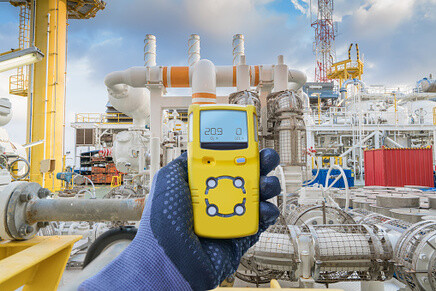Vendors with solutions that can generate critical business information will find greater growth opportunities, finds Frost & Sullivan
The rising interconnectivity among devices in industries is opening up the market for wireless gas sensors. These sensors can be installed in smartphones and are designed to support Bluetooth, Wi-Fi, near-field communication, and other wireless connections. Their portability, low power requirements, and high-performance potential make them ideal for Internet of Things (IoT) applications, especially in critical and hard-to-reach areas in mining and oil & gas. With further improvements in battery life, ruggedness, form factor, and standardization, wireless gas sensors will find a wider application and revenue-generation potential.
 “Wireless gas detectors reduce initial implementation costs and save on maintenance through better asset allocation, workforce management, faster resources workflow, and improved safety, giving them a significant competitive edge,” said Nandini Bhattacharya, Industry Manager, Industrial team at Frost & Sullivan. “They aid real-time and easy data transfer and communication on plant floors, which allows plant staff to be more mobile and flexible when performing operations. Importantly, these detectors monitor both personnel as well as machine health.”
“Wireless gas detectors reduce initial implementation costs and save on maintenance through better asset allocation, workforce management, faster resources workflow, and improved safety, giving them a significant competitive edge,” said Nandini Bhattacharya, Industry Manager, Industrial team at Frost & Sullivan. “They aid real-time and easy data transfer and communication on plant floors, which allows plant staff to be more mobile and flexible when performing operations. Importantly, these detectors monitor both personnel as well as machine health.”
Frost & Sullivan’s recent analysis, Global Gas Sensors, Detectors, and Analyzers Market, Forecast to 2025, covers the key product segments of gas sensors, fixed gas detectors, portable gas detectors, and gas analyzers. It provides revenue breakdown by vertical markets and a market breakdown by types of gases, including hydrogen sulfide, carbon monoxide, methane, oxygen, carbon dioxide, and nitrogen oxide. This study also discusses various macroeconomic factors and trends in the main global regions of North America, Latin America, Europe, Middle East & Africa, and Asia-Pacific.
For further information on this analysis, click here.
“Fatal accidents in the industries due to gas leakages have intensified the need for safety devices like gas sensors and detectors. Additionally, the demand for analyzing multiple gases in industries has had a huge impact on the market for gas analyzers,” noted Bhattacharya. “Shale gas and tight oil exploration, as well as the stringent enforcement of occupational health and safety regulationsby government bodies across the world, are further boosting the sales volume of gas sensors, detectors, and analyzers.”
Overall, market participants need to deliver innovative solutions that not only fulfill customers’ gas sensing and detection needs but also provide them with complete visibility and critical business information. Additional revenue opportunities can be tapped by:
- Presenting solutions such as real-time visibility, two-way communications, automated notifications, and predictive maintenance of devices.
- Packaging high-quality products with smart solutions and on-time maintenance and support.
- Partnering with cross-industry participants to innovate and stay relevant.
- Focusing on wearable sensors, as their small form factor will make it possible to integrate them into badges or similar small accessories.
- Employing a combination of direct and indirect sales with greater focus on eCommerce.
Global Gas Sensors, Detectors, and Analyzers Market, Forecast to 2025 is part of Frost & Sullivan’s global Sensors & InstrumentationGrowth Partnership Service program.
About Frost & Sullivan
For over five decades, Frost & Sullivan has become world-renowned for its role in helping investors, corporate leaders and governments navigate economic changes and identify disruptive technologies, Mega Trends, new business models and companies to action, resulting in a continuous flow of growth opportunities to drive future success. Contact us: Start the discussion.
Global Gas Sensors, Detectors, and Analyzers Market, Forecast to 2025 [K26C-32]
Press Contact:
Edyta Debowska
T: +48 224816203
E: [email protected]




